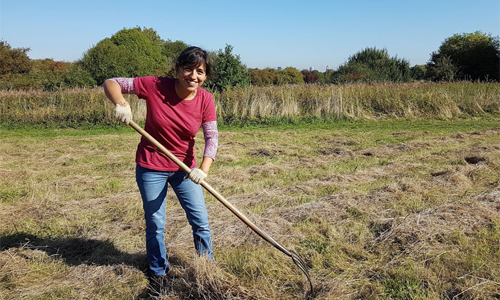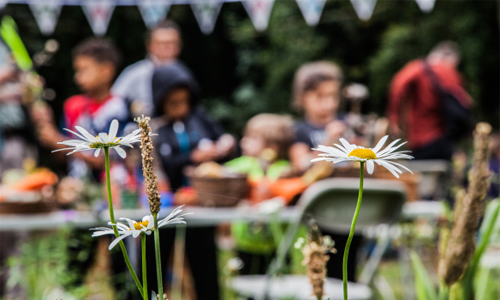Despite the dismal weather we had last Saturday, people from various walks of life gathered at the Sutton Ecology Centre for the Biodiversity Gardens workshop ‘Bees for Beginners Training Day’. Guest speaker David Pinnock, a long term volunteer for the Bumblebee Conservation Trust (BBCT), led the day with an interesting talk on bumblebees, which covered their ecology, identification and the work of the BBCT.

Common carder bee
- Buff-tailed bumblebee (Bombus terrestris)
- White-tailed bumblebee (Bombus lucorum)
- Garden bumblebee (Bombus hortorum)
- Early bumblebee (Bombus pratorum)
- Common carder bee (Bombus pascuorum)
- Red-tailed bumblebee (Bombus lapidarius)
- Tree bumblebee (Bombus hypnorum)
- Heath bumblebee (Bombus jonellus)
- David Pinnock leading a talk on bees
Unfortunately bees have had a lot of press coverage over recent years because of the dramatic decline in their numbers. Many of the flower-rich meadows which bees rely on for food and nesting have been replaced with agricultural fields which do their very best to reduce the ‘weeds’ which bumblebees need for survival. Bees are an excellent example of why wildlife is important to people, as their role in our ecosystem depicts what conservationists’ term ‘ecosystem services’. Ecosystem services is basically a fancy term used to describe the benefits we receive from wildlife, whether it is purely aesthetic, or because wildlife provides us with some kind of service we depend upon such as crop pollination. Everybody knows that bees pollinate flowers, but did you know that bumblebees are the sole pollinator of tomato plants, and without them we would not have any of the tomato-based food products which are so popular in our diets? It’s not just tomatoes we would lose without bees either, many of our cereals and fruit would cease to end up on our plates without the helping hand of pollination from bees.
By providing this workshop, we have hopefully inspired people to take a greater interest in bees and understand their importance to us. Everybody can help bees by simply having bee-friendly plants in their garden, or go further by creating a wildflower meadow. The great thing about helping bumblebees is that you are also indirectly helping other insects such as butterflies which utilize the same habitat.
Our next workshop will be ‘Trees for Beginners’ on Saturday 21st September, to book a place visit here. For more information on the Biodiversity Gardens project and to see a full list of events ran by the London Borough of Sutton then visit the events tab on this site. If you would like more information on wildlife-friendly gardening you can also pop us an email to biodiversity@sutton.gov.uk.
Robin Searle,
Biodiversity Assistant.







